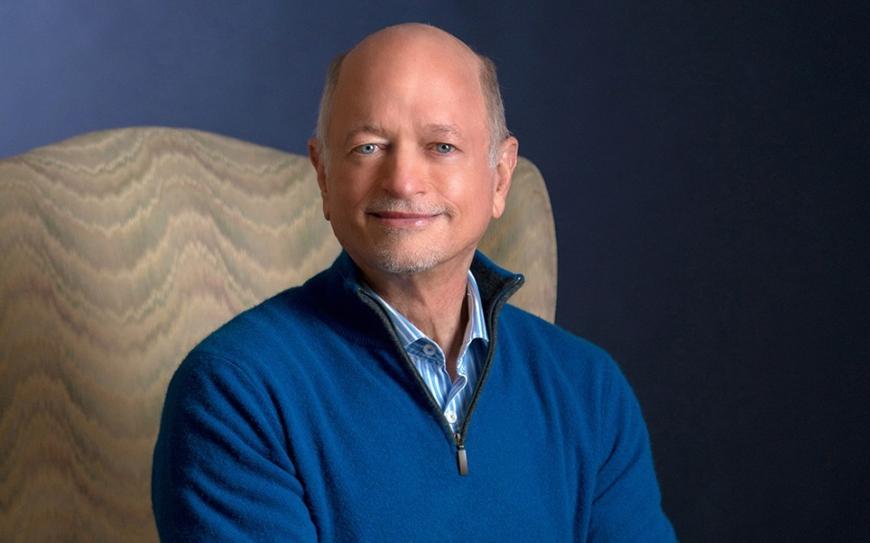
Jeffrey Thomas loves what he does as the artistic director and conductor of American Bach Soloists. His passion for Baroque music, for interpreting composers as closely as he can to what they put on the page — “revealing the music,” he calls it — and for passing on that love and knowledge to young musicians is infectious — so much so that the ABS has been around more than three decades, with a stellar reputation. Thomas has been called “unsurpassable as a Bach interpreter,” and a reviewer at Opera News wrote, “Jeffrey Thomas draws crisp, vital playing from the ace Baroque instrumentalists of American Bach Soloists, who provide galvanizing vigor but also caress the gut strings of their period instruments with unusual beauty.”
Thomas began his musical life as a singer, receiving a prestigious Adler Fellowship from San Francisco Opera. His background as a singer informs his conducting, he says, making him search deeply for the meaning in music without words. And sometimes that knowledge of singing and instrumental specifics comes together: Thomas leads ABS’s annual holiday concerts this month, including two performances of Handel’s Messiah at Grace Cathedral (Dec. 15–16).
The conductor talked with SF Classical Voice about his aim to make what’s on the page audible for listeners; not wanting a hierarchal structure in the orchestra; loving Baroque music for its specificity, harmony, and ability to move a listener from one place to another; and how it’s a joy to work with the musicians in the ABS Academy, the ensemble’s training program.
How do you feel like being a singer has helped you as a conductor?
Every conductor brings to their work elements of being a musician that they learned from whichever instrument was theirs. I feel fortunate that singing was my entryway because it’s so focused on words and texts and meanings that are hard to deny when you have specific words there. It has always helped me search deeply for what I believe was the composer’s absolute intention in instrumental music.
One thing I know for sure is that no composer puts a speck of ink on a page without thinking about it very much, and certainly among the great composers, there’s a reason why a note is as long as it is or as high as it is or whatever. When we have words under the notes, it’s probably a bit easier to feel we understand why the composer made those choices. It’s not quite so easy when there are not words, but the same elements are on the page, and we see choices having been made regarding the technique of the composition.
![[Jeffrey Thomas | Credit: Eddie Frank]](/sites/default/files/styles/full_width_content_870x/public/media/images/2022-12/jeffrey_thomas_aside1_0.jpg?itok=SJe0MxYY)
Can you say more about how you can know what the composer wants?
Let me preface this by saying I appreciate different approaches to performance. In some cases, it is really a particular artist’s rendition that we may be interested in or a composer’s overlay. … I appreciate that very much. For me, that’s not what I’ve ever wanted to do. I’ve never wanted to do something to the music. I’ve always just wanted to reveal the music so that a listener who may not know much about music but is moved by it, as we all are, would comprehend through what they hear the things that we as the performers have access to on the page. We can see a crescendo, or we can see some effect, or we can see the different values of a higher pitch or a lower pitch in context. We have to make that audible — or maybe the word is palpable — to a listener who’s not seeing the page. Honestly, I feel very lucky that this has been my work because it’s a fortunate calling to be, with all my colleagues, entrusted with doing that and being the link between the composer and a piece of music and the experience of a listener.
What led you to founding American Bach Soloists?
It was a very long time ago — probably 35 years ago. It came about from a very nice situation and a practical one. At that time, there was, relatively speaking, a handful of people who specialized in [historical] performance. It was wonderful because at the end of the job, in Oskaloosa, Iowa, or wherever it might have been, we almost didn’t have to say goodbye to each other because you’d run into the same people a few weeks later in some other town where there was an organization that had made a decision to engage who they believed were specialists in this music. So it was a small group of people.
But the odd thing was that we were going around from place to place and experiencing, you know, different conductors, different sets of logistics, and we just started scratching our heads and thought, “What would it be like if we just did this on our own and didn’t have to depend on being called to some remote town, if we made the decision to gather together on our own?” That’s how we were formed: so we didn’t have to depend on those invitations. In the beginning, it was pretty much exclusively the cantatas of Bach — we loved those performances. But then the repertory grew because our audience grew, and we wanted to incorporate all that great music. As the size of the ensembles grew, I began to work more as a conductor than purely a music director.
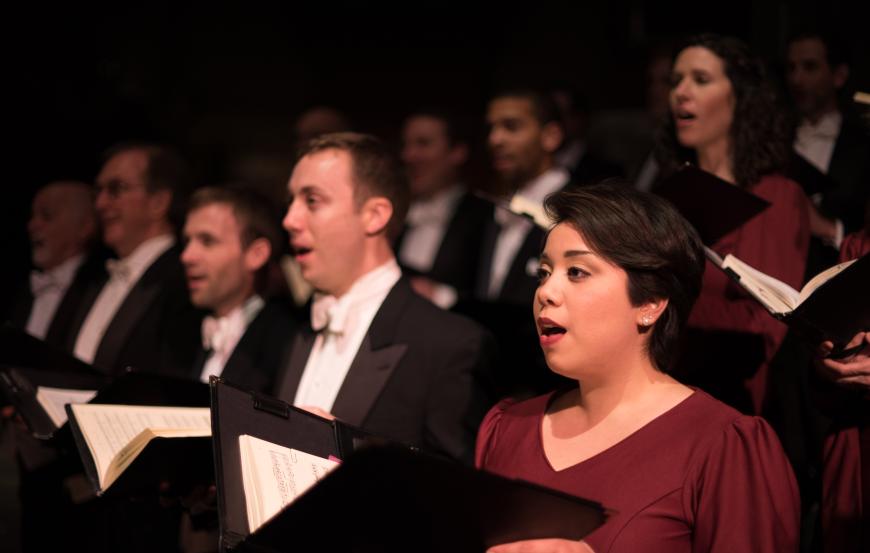
What do you think is the relationship of a conductor to an orchestra, or what do you want yours to be?
I am not really an advocate for some of the hierarchical logistics of orchestras and conductors. Not only does it seem to be a not-very-contemporary approach to have superiors and those who are subject to them, it’s just not good thinking in many ways. But I also have been sensitive to the effects of one’s placement within an orchestra. I mean if you’re the last second violinist, that does not feel the same as being up front. As great as all musicians are, and as much as they bring everything they have to the plate, I think there is something lost in this general hierarchy. So as a conductor, I’m there first and foremost to help, if I can, wonderful musicians bring everything they have to give to the moment in a way that builds their sense of community [and] of being really of one mind.
One of the things that conductors often do is present a plan, a kind of game plan, if not even more dictatorial, about what the thinking should be at one moment. But I’ll tell you, this summer at our festival, we put on, I think, eight different programs in about nine days. The last performance included some well-known works, like Handel’s Water Music, but I sort of deliberately didn’t plan a whole lot of rehearsal for it because I knew that over the course of that week, the musicians we had at our festival would build such a bond with each other. Eight of them played the Mendelssohn Octet, for example, and that must be a wonderfully bonding experience. I just wanted to build on that and establish the fact that musicians at a certain level can make glorious music. They have the ability to just do that.
I try to be the person who is listening maybe most carefully to everyone, who can maybe find a moment or place where somebody can be polished a little bit more, to react to what I’m hearing. I do bring something more than that in terms of musical shapes and plans, but I swear to you, I believe they’re always based on what’s on the page. That’s what I try to do: to bring what’s on the page out from all that talent that’s there with me into a cohesive, coherent, and concise performance, which adds up to something clear for the listener to experience. I’m not about, “Do this, do that.” I’m about, “Let me help you do what you can do so beautifully.”
This is a big question, but could you talk about why you love Baroque music so much?
In college, I was a math major for a short while, or a double major, but I think there was something about Baroque music and the mechanics of it, the harmony, what we get from it, which was very mathematical and scientific and understandable in clear ways. In fact, we know this is true, right? There are untold numbers of people in the medical field, for example, who are amateur musicians. There’s a strong connection between Bach and the sciences.
I was drawn to [Baroque music] early on, maybe because of my schooling. Also, when I was young, a very talented harpsichordist moved to my hometown, which was sort of a very strange event, as you can imagine. A number of friends and I were drawn to this person, and all started taking lessons. Then I had another friend who, in the countryside of Pennsylvania, in one of their barns, had installed a pipe organ, which somehow survived the freezing cold winters.
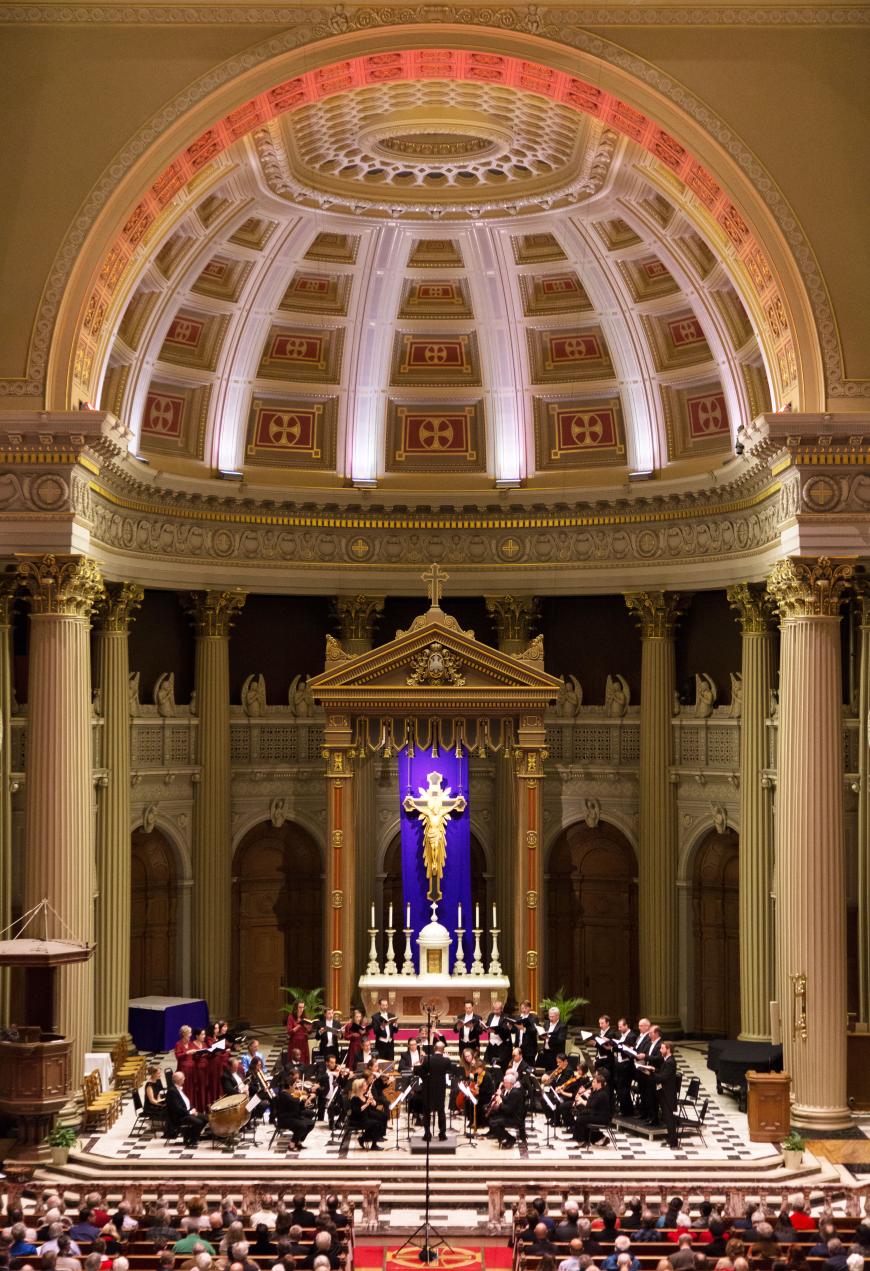
We were interested in the mechanics of Baroque music and its intelligibility. I also loved that much of Baroque music is really about something quite specific. If you look at Bach, every aria is about something. It can be distilled into pretty much a one-word summary, what that particular aria is about. In Handel’s operas, there are half a dozen or so generic types: rage arias, victory arias, sad arias, love arias. I love that this music can so expressively get a point across.
With later music sometimes, and in a wonderful way, more of the understanding is left to the individual listener. We can have our own take on something. … This is a little anecdote: A couple weeks ago, I heard a piece by a composer at the Conservatory. Before the performance, I asked him, “What is this about?” He said, “Well, it’s about a lot of things, but about nothing. It’s a collection of moments and events and sound, and it’s really that way so that the listener can create their own story line, their own comprehension.” I thought that was amazing. And you know what? It worked. It was fantastic.
So in general, I think it’s the specificity of the music and how these great Baroque composers could so ably move a listener from one place to another with such consistent success. This is powerful music, and then its language is so clear. And add into that it’s music that’s kind of easily understood by most people. When people haven’t heard Bach, for example, and then you play some Bach, it’s pretty rare that they don’t like it. So it speaks to us. And Baroque music, especially Bach’s music, is so deeply driven by harmony and harmonic movement and where the harmony is going, where it comes from, where it goes in the middle, and where it arrives. We as listeners pretty much sense all that. We know, “Oh, it’s going to go there, isn’t it? Oh, yes, it did go there.”
You taught at UC Davis, and you have a training program at ABS. What do you like about teaching?
I’ll be completely honest. When I first was hired at UC Davis, I had no experience teaching at the university level, and I was quite — what’s the word? — humbled. I was humbled by the prospect. But then over the course of the next couple of years, it turned out that I loved teaching. It’s a wonderful thing to have people trust you to pass on something of value. I mean, it’s a great profession. I was inspired by that.
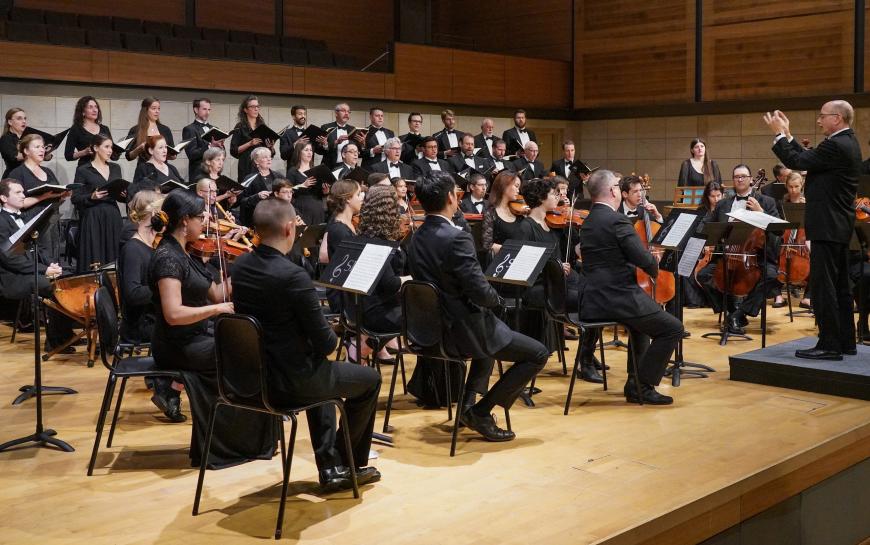
That really is the reason for our Academy having been started. At the time, this is now 13 or so years ago, we had a number of ABS musicians, and we were kind of wondering, “What is the future? Where are the next players going to come from?” We thought, “Let us find a way to at least pass on what we know we’re very good at.” After 50 or so years of solid discovery about Baroque music, as is true for any kind of information, the further we go in time, the more data there is, and the less it’s actually possible to know everything that came before it. We wanted to find a way to pass on what we knew, to sort of begin to hand things over, and that’s why we started the Academy.
It turned out to be such a fulfilling and wonderful thing. Musicians came from I don’t know how many countries, I think 30, and their absolute passionate interest in learning what we knew was just fantastic to discover. Since then, some wonderful training programs were developed at major conservatories. When I was at Juilliard — I’m joking a little bit — but almost no one played music before Brahms. There was certainly no Baroque music at Juilliard, and now one of the best programs in the world is at Juilliard. So there has been a great renaissance, I guess, or reestablishment of Baroque music training programs, and we’re glad that we’ve been part of that.
The ABS Academy has changed ABS in a significant way. We’re really proud of the diversity of our musicians now that that occurred organically due to the international exposure of our ABS Academy, which has brought to us dynamic musicians who are deeply committed to the music that we perform and who are now at the core of our organization. It has been a benefit to our audiences, to our organization, and to these wonderful musicians who were able to use ABS as a sort of launching pad between their formal studies and having careers, and they’ve all gone on to do amazing things, very often with each other, with relationships that were forged here. To me, that’s absolutely one of the most satisfying aspects of our existence as an organization.
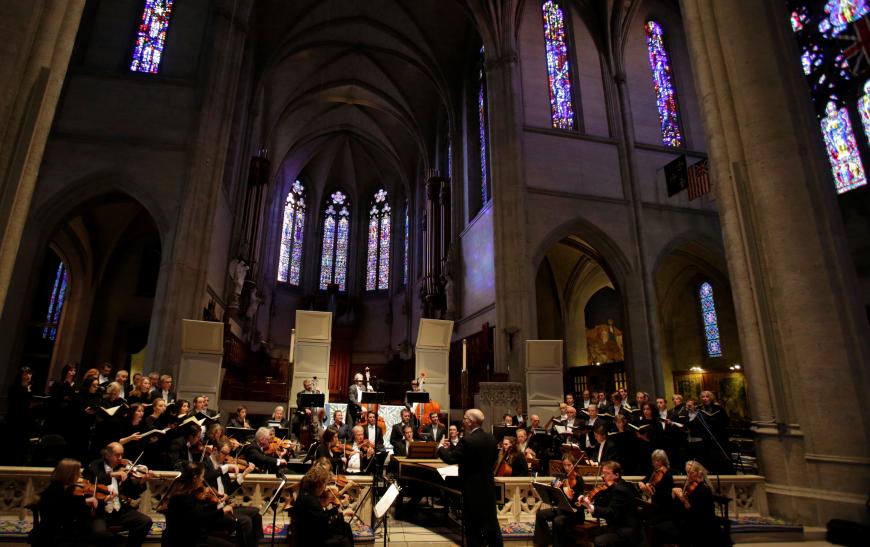
What would you like people to know about your coming season?
Since the beginning of the pandemic, like other organizations, we have been actively looking at how we would emerge and be a more vital and more relevant organization and how we could engage with our audiences in new ways and with a focus on how our musicians and audiences will interact with each other. I think there’s a general feeling that an organization that is unchanged since the pandemic is one that is not very awake and is missing opportunities.
As far as our plans, there are three things. I feel fortunate people have historically looked to ABS specifically for a very high level of polish and detail in Baroque performance. We’re very grateful for that recognition and reputation. We’ve made a recommitment to annually present the major works of Bach, not least because we recognize their timeless value, and that applies to new audiences as well as experienced ones. For us, it’s not so much a matter of presenting different music in a different way but hanging on to what we know has intense value, and we’re recommitted to that.
The second thing is, yes, our Academy is coming back in 2023, for the first time since 2019. Then the third is over the coming months: Our plans for some new concert experiences are going to be announced. We’re still fine tuning them, but we’re looking forward to sharing news about that with everyone in the community very soon. There’s a lot in the works and a lot of polishing to do, just as we do with our music.



